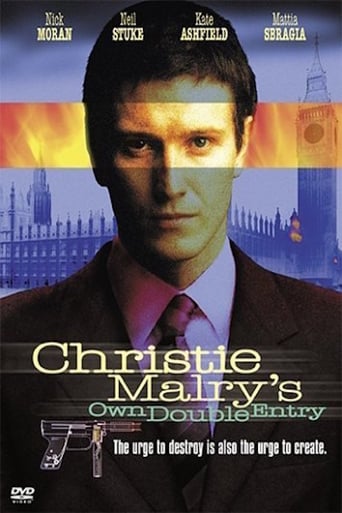

There are many things about this movie which had me both yelling at the screen and at those that were watching the movie with me. The scenes that use fire look so bad that they should have been left out completely, especially since they were not originally in the book. The scenes from the renaissance period added nothing at all to the movie yet take up about a third of the film. Christie Malry's mother and childhood friend are characters that either should not have been shown or should have actually been used to move the plot along. In closing this was a movie that barely seemed to have a focus and had too many characters and scenes that had no business being in the movie, try to avoid watching it.
... View MoreChristie Malry's Own Double Entry should get a rare reprieve from the vaults of British film obscurity, a rare thing in British film, particularly as it came out during the attack of British idiotic Indies, out-and-out failures, mostly funded by the Taxpayer (e.g Shooting Fish, Rancid Aluminium, Lock, Stock.... etc).Most of those films came and went. But Christie Malry, based on the novel of cult English experimentalist novelist BS Johnson, and in which Lock Stock actor Moran plays the lead, is the best of these, although ironically it was never released or given any attention, presumably due to its playful, po-faced attitude to terrorism, which would never play post 9/11 (it was made before those events). This in itself is ironic, as Christie is an interesting study in terrorism, a sort of book-keeping Billy Liar who starts his own Fight Club-like crusade worthy of the UniBomber, which attains an added poignancy post 9/11- after all, in the film, made remember in 1999, Christie's surreptitious efforts help start the second Gulf War (and he is portrayed by the media as an Arab).I understand some of the criticisms of the film made by others below, such as Christie's unbelievable jobs, although Christie's bizarre double-entry system- e.g. "debit: Wagner's Lack of Sympathy: Credit: girl at butcher's shop smiled at me", to my mind makes him a more believable character- after all, he is hardly a balanced character.I can add some more myself (the failure to update the seventies novel to the present decade, leading to weird anachronisms- a result of lack of funding or attention in art direction?). But I also believe the film is a brave attempt at finding intelligence and depth in the British indie.Tickell is clearly an admirer of Greenaway, and this shows throughout, in the film's theatrical flair and sense of the visual, as well as the oddball eroticism, all part a way of understanding Christie's abnormal psychology. This is particularly evident in the 'historical' sub-plot of the film (the development of double-bookkeeping in Renaissance Milan by a priest with links to Da Vinci).And I think the acting is marvellous throughout, particularly the Renaisance Italians and Shirley Ann Field as Christie's mother, and Moran, while not a brilliant actor, clearly works hard in the complex task of being Christie (he says it is his best film, although I don't think there's much competition- with the exception of Puritan, another little known British Indie with Moran at its centre).
... View MoreSo you're a fan of B. S. Johnson's novel 'Christie Malry's Own Double-Entry', you admire his experimentation and playfulness with the literary form, you enjoy the black humour and anti-capitalist message, and, most importantly, the manner in which Johnson never allows his reader to forget that this is a work of fiction, using such devices as Christie himself talking directly to the author?Then on no account watch this film.You'll spend the whole time shouting at the screen wondering how they could have missed the point so comprehensively. In an interview on the DVD the screenwriter claims to have stayed faithful to the book, which is laughable. I won't go into too much detail, but here's two key point for you to think about:1) The biggest debit recorded by Christie is that socialism has not been given a chance. This is essentially the political message of the novel, but not mentioned in the film.2) In the film, Christie en-route to Westminster when his own bomb destroys the bus he is riding on. The implication is that he causes his own downfall, is responsible for his own death. In the book, he dies from cancer, randomly. So the complexity and open-endedness of the book (Johnson refuses to tell us if he destroys parliament or not) is lost is the cause of a nice understandable ending that will not tax the brains of the audience. All in all, enormously disappointing. B. S. Johnson subversively refuses to to describe Christie, saying we must create him in our own way (like God). So I suppose all sorts of interpretations are acceptable, but this is a very, very poor one.Luke Haines's soundtrack is excellent, though.
... View MoreWith a limited budget and resources, Paul Tickell has done a fantastic job of bringing Johnson's unique perspective to the screen. Nick Moran does well at playing a character that is almost a cipher but has a darkness within him that no-one detects until it's far too late. References to Princess Diana and attacks on Iraq bring the tale right up to date and, frustrating as it was, I can see why this was pulled from its original mid-September release date.Luke Haines is a God.
... View More